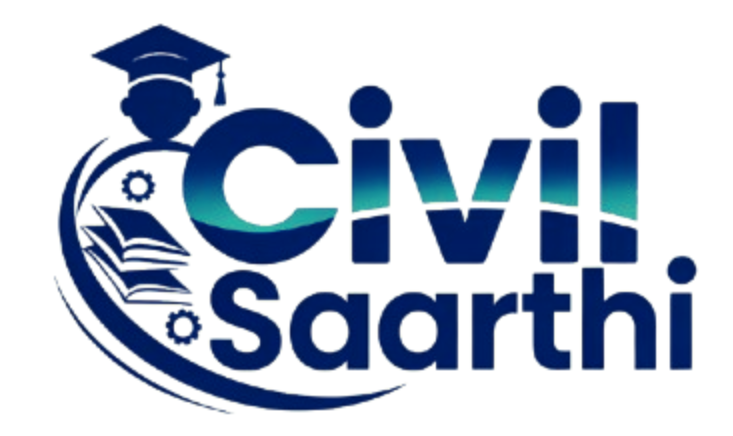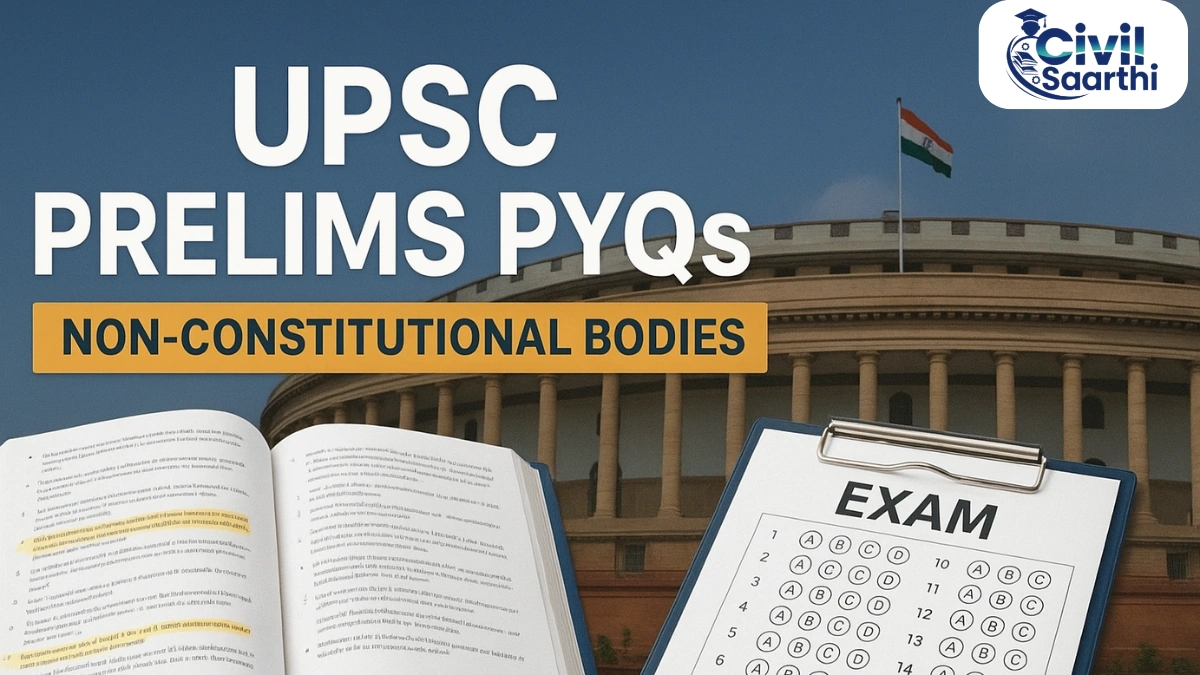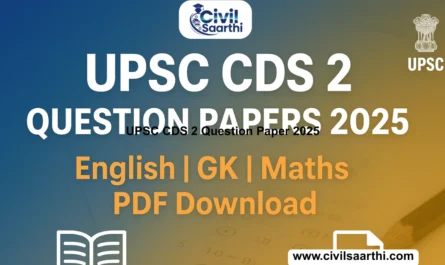UPSC Prelims Polity topic-wise PYQs on Non-Constitutional Bodies (1995–2025) help aspirants understand the role and relevance of various statutory, regulatory, and extra-constitutional institutions like NITI Aayog, NHRC, CBI, Lokpal, and others. These bodies, though not mentioned in the Constitution, play a crucial role in governance, policy-making, and accountability.
UPSC Prelims Polity Topic-wise PYQs on Non Constitutional Bodies 2025-1995
Analyzing UPSC Prelims Polity Topic-wise PYQs on Non Constitutional Bodies 2025-1995 helps in identifying recurring themes, important provisions, and the UPSC’s evolving focus on these institutions in the context of transparency, efficiency, and checks on executive power. Regular practice of these PYQs sharpens conceptual clarity and improves accuracy in the exam.
Q1. The North Eastern Council (NEC) was established by the North Eastern Council Act, 1971. Subsequent to the amendment of NEC Act in 2002, the Council comprises which of the following members? [2024]
- Governor of the Constituent State
- Chief Minister of the Constituent State
- Three Members to be nominated by the President of India
- The Home Minister of India
Select the correct answer using the code given below:
a) 1, 2 and 3 only
b) 1, 3 and 4 only
c) 2 and 4 only
d) 1, 2, 3 and 4
Ans a
Q2. In India, Legal Services Authorities provide free legal services to which of the following types of citizens? [2020]
- Person with an annual income of less than Rs. 1,00,000
- Transgender with an annual income of less than Rs. 2,00,000
- Member of Other Backward Classes (OBC) with an annual income of less than Rs. 3,00,000
- All Senior Citizens
Select the correct answer using the code given below:
a) 1 and 2 only
b) 3 and 4 only
c) 2 and 3 only
d) 1 and 4 only
Ans a
Q3. The Government of India has established NITI Aayog to replace the: [2015]
a) Human Rights Commission
b) Finance Commission
c) Law Commission
d) Planning Commission
Ans d
Q4. With reference to National Legal Service Authority, consider the following statements: [2013]
- Its objective is to provide free and competent legal services to the weaker sections of the society on the basis of equal opportunity.
- It issues guidelines for the state legal services authorities to implement the legal programmes and schemes throughout the country.
Which of the statements given above is/are correct?
a) 1 only
b) 2 only
c) both 1 and 2
d) Neither 1 nor 2
Ans c
Q5. Which of the following bodies does not/do not find mention in the constitution? [2013]
- National Development Council
- Planning Commission
- Zonal Councils
Select the correct answer using the codes given below.
a) 1 and 2 only
b) 2 only
c) 1 and 3 only
d) 1, 2 and 3
Ans d
Q6. With reference to consumers’ rights/ privileges under the provisions of law in India, which of the following statements is/arc correct? [2012]
- Consumers are empowered to take samples for food testing.
- When a consumer files a complaint in any consumer forum, no fee is required to be paid.
- In case of death of a consumer, his/her legal heir can file a complaint in the consumer forum on his / her behalf.
Select the correct answer using the codes given below
a) 1 Only b) 2 and 3 Only
c) 1 and 3 Only d) 1, 2 and 3
Ans c
Q7. With reference to the Consumer Disputes Redressal at district level in India, which one of the following statements is not correct? [2010]
a) A State Government can establish more than one District Forum in a district if it deems fit.
b) One of the members of the District Forum shall be a woman.
c) The District Forum entertains the complaints where the value of goods or services does not exceed rupees fifty lakhs.
d) A complaint in relation to any goods sold or any service provided may be filed with a District Forum by the State Government as a representative of the interests of the consumers in general.
Ans c
Q8. Consider the following statements: [2009]
- Central Administrative Tribunal (CAT) was set up during the Prime Minister ship of Lal Bahadur Shastri.
- The Members of CAT are drawn from both judicial and administrative streams.
Which of the statements given above are correct?
a) 1 only b) 2 only
c) Both 1 and 2 d) Neither 1 nor 2
Ans b
Q9. Which of the following institutes have been recognised as the Institutes of National Importance (by an Act of Parliament)? [2004]
- Dakshina Bharat Hindi Prachar Sabha, Chennai.
- National Institute of Pharmaceutical Education and Research, Mohali.
- Sree Chitra Tirunal Institute for Medical Services and Technology, Thiruvananthapuram.
- Lakshmibai National Institute of Physical Education, Gwalior.
Select the correct answer using the codes given below:
Codes:
a) 1, 2 and 3 b) 3 and 4
c) 1, 2 and 4 d) 1, 2, 3 and 4
Ans a
Q10. According to the National Human Rights Commission Act, 1993, who amongst the following can be its Chairman? [2004]
a) Any serving Judge of the Supreme Court
b) Any serving Judge of the High Court
c) Only a retired Chief Justice of India
d) Only a retired Chief Justice of High Court
Ans c
Q11. Consider the following statements about the minorities in India: [2001]
I. The Government of India has notified five communities, namely, Muslims, Sikhs, Christians, Buddhists and Zoroastrians as Minorities.
II. The National Commission for Minorities was given statutory status in 1993.
III. The smallest religious minority in India are the Zoroastrians.
IV. The Constitution of India recognises and protects religious and linguistic minorities.
Which of these statements are correct?
a) II and III b) I and IV
c) II, III and IV d) I, II, III and IV
Ans c
Q12. Consider the following statements regarding the National Human Rights Commission of India: [1999]
I. Its Chairman must be a retired Chief Justice of India.
II. It has formations in each state as the State Human Rights Commission.
III. Its powers are only recommendatory in nature.
IV. It is mandatory to appoint a woman as a member of the Commission.
Which of the above statements are correct?
a) I, II, III and IV b) II and IV
c) II and III d) I and III
Ans d
Q13. Assertion (A): The word ‘minority’ is not defined in the Constitution of India. [1996]
Reason (R): The Minorities Commission is not a constitutional body.
In the context of the above two statements, which one of the following is correct?
a) Both A and R are true and R is the correct explanation of A
b) Both A and R are true but R is not a correct explanation of A
c) A is true but R is false
d) A is false but R is true
Ans b
Q14. Which of the following are the States in which the LokAyukta Act includes the Chief Minister in its ambit? [1995]
a) West Bengal and Kerala
b) Gujarat and Maharashtra
c) Madhya Pradesh and Orissa
d) Rajasthan and Karnataka
Ans d


